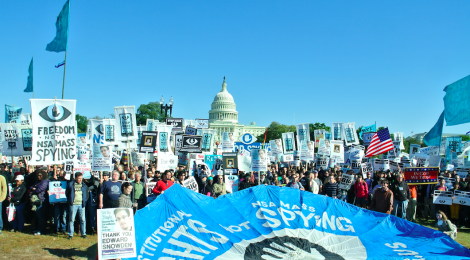
U.S. Mass Surveillance: Striking the Balance Between Security and Liberty
In the current War on Terror, American liberties are continually unjustly forsaken. The struggle between ensuring public safety and upholding personal privacy dates back to 1978, when President Carter signed the Foreign Intelligence Security Act (FISA) into effect. This act allowed for “physical and electronic surveillance of foreign powers and agents.”[1] Two decades later, after 9/11, President Bush signed the USA Patriot Act. Section 218 of the Patriot Act “broaden[ed] the circumstances when secret FISA authorities could be used” and eliminated many of the “safeguards against abuse.”[2] Previously, FISA required that the U.S. government must prove that the sole purpose for surveillance was to obtain foreign intelligence. With the help of the Patriot Act, the government was now only held accountable for proving that foreign intelligence was simply “a reason” for surveillance.
Recently, FISA has faced a series of legal challenges and amendments, but the most significant and impactful has been ACLU v. Clapper. It began in an uproar amongst the public, when Edward Snowden in 2013 disclosed numerous global surveillance programs and leaked classified information from the National Security Agency (NSA). In response, the American Civil Liberties Union filed a petition against the Director of National Intelligence, James R. Clapper. In ACLU v. Clapper (2013), the United States District Court for the Southern District of New York initially dismissed the case by ruling that metadata collection did not violate the Fourth Amendment. While the presiding judge, Judge William Pauley, agreed that unchecked metadata programs “imperil the civil liberties of every citizen,” he contended that telephone metadata collection would have “furnished the missing information” and prevented 9/11. He explained how the “reasonable articulable suspicion” requirement preempts against general data browsing and provides for a query that is “ordered and controlled;” but most importantly, Judge Pauley ruled that Section 215 of the Patriot Act implicitly precludes judicial review.[3] Nine months later, this precedent was overturned in the United States Court of Appeals for the Second Circuit.
The American Civil Liberties Union, in appealing to the United States Court of Appeals, maintained that there was no preclusion to judicial review under Section 215 and that the government had put into place a surveillance program that unjustly intrudes on personal privacy. Fortunately, the Court of Appeals, taking a rather purposive approach, determined that a decision regarding general metadata collection would come with “substantial debate, and expressed in unmistakable language.”[4] The Court affirmed that the government should not have unrestricted access to metadata information on ordinary citizens. The ruling was, thus, in favor of ACLU.
Yet, the real significance of this verdict lies in how it holds the government accountable for the metadata collections. In order to lawfully collect the nation’s call records, the government must prove the existence of “tangible things…relevant to an authorized investigation (other than a threat assessment).”[5] The threat assessment states that the government is required to prove that there exists a reason for the investigation and the obtained information pertains to the investigation. The government failed to bear this burden of proof, which overturned the district court’s previous decision.
The US Court of Appeals for the Second Circuit found that the telephone metadata program “exceeds the scope of what Congress had authorized.”[6] But a crucial component in looking at what our elected officials had authorized was determining what constitutes a “search” and whether or not that search is “reasonable.” Looking to past legal precedents, courts have applied the definition for “search” provided under United States v. Jones (2012). In 2011, a GPS device was attached to the car of nightclub owner Antoine Jones without his knowledge. After the Supreme Court of the United States recognized both sides of the legal dispute, the Court unanimously ruled in favor of Jones. In doing so, the justices managed to define “search” as “the Government’s physical intrusion on an ‘effect’ for the purpose of obtaining information.”[7] This clarification has allowed for judges to apply a common definition to the ambiguous term, leaving them only to question whether or not each search is, indeed, reasonable. While this remains a troubling issue, as demonstrated by ACLU v. Clapper, United States v. Jones has mitigated the predicament not only in the aforementioned sense, but also by recognizing our transition into a world of technology.
Over a year before the Snowden leak, Justice Sonia Sotomayor’s concurrence in United States v. Jones raised light on issues of government surveillance that came with the public disclosure of the NSA programs. Sotomayor warned that the digital age should reconsider whether “an individual has no reasonable expectation of privacy in information voluntarily disclosed to third parties.” She further explained that citizens can only obtain constitutionally protected status when “our Fourth Amendment jurisprudence ceases to treat secrecy as a prerequisite for privacy.”[8] This is, undeniably, true. The government continues to assume that a person reluctant to share the mundane tasks they carry out on a day-to-day basis is reason enough to believe they have something to hide. Nonetheless, Sotomayor says that nonetheless this information is not “disentitled to Fourth Amendment protection.”[9] Her argument has been used as a legal precedent in multiple federal court appeals to uphold the collection of some cellphone data, and similarly used in two cases that “rejected at least some such data collection as an improper search.” As we become more reliant on technology in our everyday lives, it is very likely that courts will continue to use the concurrence of Justice Sotomayor as similar cases arise.
The jurisdictions of the aforementioned cases, and the heightened anger amongst the public, inspired many of the modifications Congress made to several provisions of the Patriot Act before restoring the law under the Freedom Act. The Freedom Act banned the bulk collection of telecommunication data by US agencies, but maintained Section 215 of the Patriot Act by extending authorization for “roving wiretaps and the lone wolf surveillance authority.”[10] Additionally, phone companies are now responsible for “holding, searching and analyzing mass telephone data at the government’s request.”[11]The broader set of data held by many companies makes this system even more troublesome. And so the battle between national security and civil liberties endures, leaving many of us to wonder when we will find a balance between the two.
The aura of fear that consumes this nation has prompted the government to implement policies that infringe on our dearest rights as American citizens. Many have been rescinded; many have not. It’s important that we continue to raise questions on the constitutionality of mass surveillance by the government. And most of all, it’s important that we recognize which laws maintain our safety, all the while preserving our Constitutional rights, and which do not.
[1] Paul Bischoff, “A Breakdown of the Patriot Act, Freedom Act, and FISA,” Comparitech, July 13, 2017, https://www.comparitech.com/blog/vpn-privacy/a-breakdown-of-the-patriot-act-freedom-act-and-fisa/.
[2] “Foreign Intelligence Surveillance Act (FISA) · Surveillance,” Center for National Security Studies, July 2017, http://www.cnss.org/pages/foreign-intelligence-surveillance-act-fisa.html
[3] ACLU v. Clapper, (US District Court Southern District of New York 2013). https://apps.washingtonpost.com/g/documents/world/us-district-judge-pauleys-ruling-in-aclu-vs-clapper/723/
[4] ACLU v. Clapper, (US Court of Appeals for the Second Circuit 2015). https://www.aclu.org/sites/default/files/field_document/clapper-ca2-opinion.pdf
[5] “American Civil Liberties Union v. Clapper,” Columbia University: Global Freedom of Expression, July 28, 2017, https://globalfreedomofexpression.columbia.edu/cases/aclu-v-clapper/
[6] Mark Anderson, “USA PATRIOT Act’s Worst Provisions Set to Expire,” July 13, 2017. http://americanfreepress.net/usa-patriot-acts-worst-provisions-set-to-expire/?print=print
[7] “US v. Jones,” Cornell Law School: Legal Information Institute, July 13, 2017. https://www.law.cornell.edu/supremecourt/text/10-1259
[8] Nicole Flatow, “What Courts Have Already Said About the Phone Tracking NSA Might One Day Undertake,” Think Progress, July 13, 2017, https://thinkprogress.org/what-courts-have-already-said-about-the-phone-tracking-nsa-might-one-day-undertake-c067f3ec850a
[9] Id. [8]
[10] Id. [1]
[11] Id. [1]




